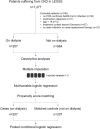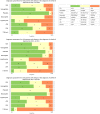SARS-CoV-2 infection in chronic kidney disease patients with pre-existing dialysis: description across different pandemic intervals and effect on disease course (mortality)
- PMID: 35486356
- PMCID: PMC9052729
- DOI: 10.1007/s15010-022-01826-7
SARS-CoV-2 infection in chronic kidney disease patients with pre-existing dialysis: description across different pandemic intervals and effect on disease course (mortality)
Abstract
Purpose: Patients suffering from chronic kidney disease (CKD) are in general at high risk for severe coronavirus disease (COVID-19) but dialysis-dependency (CKD5D) is poorly understood. We aimed to describe CKD5D patients in the different intervals of the pandemic and to evaluate pre-existing dialysis dependency as a potential risk factor for mortality.
Methods: In this multicentre cohort study, data from German study sites of the Lean European Open Survey on SARS-CoV-2-infected patients (LEOSS) were used. We multiply imputed missing data, performed subsequent analyses in each of the imputed data sets and pooled the results. Cases (CKD5D) and controls (CKD not requiring dialysis) were matched 1:1 by propensity-scoring. Effects on fatal outcome were calculated by multivariable logistic regression.
Results: The cohort consisted of 207 patients suffering from CKD5D and 964 potential controls. Multivariable regression of the whole cohort identified age (> 85 years adjusted odds ratio (aOR) 7.34, 95% CI 2.45-21.99), chronic heart failure (aOR 1.67, 95% CI 1.25-2.23), coronary artery disease (aOR 1.41, 95% CI 1.05-1.89) and active oncological disease (aOR 1.73, 95% CI 1.07-2.80) as risk factors for fatal outcome. Dialysis-dependency was not associated with a fatal outcome-neither in this analysis (aOR 1.08, 95% CI 0.75-1.54) nor in the conditional multivariable regression after matching (aOR 1.34, 95% CI 0.70-2.59).
Conclusions: In the present multicentre German cohort, dialysis dependency is not linked to fatal outcome in SARS-CoV-2-infected CKD patients. However, the mortality rate of 26% demonstrates that CKD patients are an extreme vulnerable population, irrespective of pre-existing dialysis-dependency.
Keywords: CKD5D; COVID-19; Hemodialysis; Kidney; SARS-CoV-2.
© 2022. The Author(s).
Conflict of interest statement
Felix C. Koehler reports grants by Else Kröner-Fresenius-Stiftung, by the German Research Foundation under Germany’s Excellence Strategy—EXC 2030: CECAD—Excellent in Aging Research—Project number 390661388, by the Maria-Pesch Stiftung, Cologne and by the Koeln Fortune program/Faculty of Medicine, University of Cologne outside of this project. All authors declare no relevant conflicts of interest.
Figures



References
-
- Coronavirus (COVID-19) Dashboard. https://covid19.who.int/.
-
- Flythe JE, Assimon MM, Tugman MJ, Chang EH, Gupta S, Shah J, Sosa MA, Renaghan AD, Melamed ML, Wilson FP, et al. Characteristics and outcomes of individuals with pre-existing kidney disease and COVID-19 admitted to intensive care units in the United States. Am J Kidney Dis. 2021;77:190–203. doi: 10.1053/j.ajkd.2020.09.003. - DOI - PMC - PubMed
Publication types
MeSH terms
LinkOut - more resources
Full Text Sources
Medical
Miscellaneous

